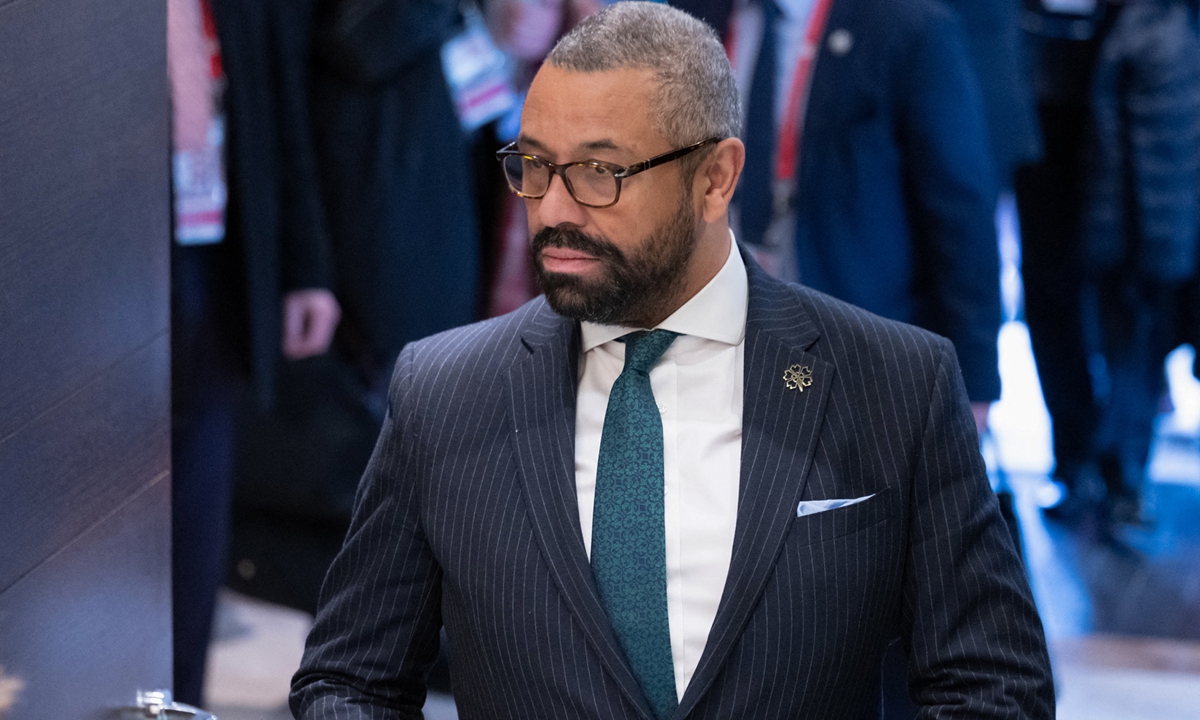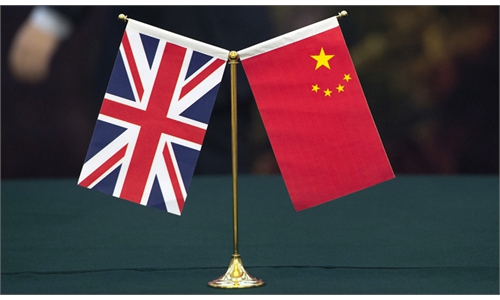
British Foreign Secretary James Cleverly Photo: AFP
British Foreign Secretary James Cleverly is set to deliver a policy speech on Tuesday local time, in which he will raise, especially to China hawks in the Conservative party, that the UK must engage with China rather than isolate it in a "new cold war," and call for "robust and constructive" relations with China.
According to words shared by Cleverly's department ahead of the speech, he would say in the speech that "it would be clear and easy — perhaps even satisfying — for me to declare a new Cold War and say that our goal is to isolate China…Clear, easy, satisfying — and wrong. Because it would be a betrayal of our national interest and a wilful misunderstanding of the modern world."
To a certain extent, this should be regarded as a correction of the UK's aggressive line involving China in the past, and an attempt to return to British balanced diplomatic tradition. It is said that Cleverly would also formulate a British version of the three-pronged approach for relations with China: limiting Chinese involvement in sectors deemed critical for national security; strengthening ties with Indo-Pacific allies; and engaging with China directly to promote stable relations. Some analysts believe that in the atmosphere of strong hostility toward China in the British political circles, the former two are more out of "political correctness" to avoid attacks from political opponents. And the third point, that is, to strengthen engagement with China, is what Cleverly wants to express most.
Although London's attitude toward China is far from changing, as Cleverly's discourse still contains clichés full of Cold War mentality, yet he also inadvertently pointed out the distorted and extremely unhealthy political reality in the UK. Some British people are satisfied with a "new cold war," while cooperation with China has been criticized. It is this countercurrent that has pushed China-UK relations astray in recent years, to this current predicament. The UK has seen rotating prime ministers in recent years, and they have been toughening their attitudes toward China, causing serious damage to the bilateral relations.
After the Sunak government came to power, it seemingly intends to put a foot on the brakes, and this willingness was also reflected in Cleverly's speech. Sunak's updated Integrated Review of foreign and defense policy says China "poses an epoch-defining challenge" rather than being a "threat" positioned by his predecessor Liz Truss, which is a moderate, albeit limited, rational callback.
Frankly speaking, the post-Brexit UK has gone too far in following the US to coordinate with the latter's global strategy, making people almost forget that the UK is a country with independent sovereignty and national interests. This has not brought the influence and status as a great power that it expected, but the continuous consumption and shrinking of its competitiveness. A typical example is that according to research by the City of London, London lost its sole lead as the world's top financial center for the first time, and tied for first place with New York. By riding the US' coattails, what the UK has lost is a broader world. More and more British people with breadth of vision have realized this.
Relatively speaking, European continental countries are not as deeply involved in Washington's geopolitical strategy as the UK, and they have adjusted earlier than the UK. Since the beginning of this year, high-level exchanges between China and Europe in various fields have quickly resumed, but the UK is absent from these interactions. This is somewhat a stimulus for the UK, which has made it hope to restore high-level exchanges with China as soon as possible. Cleverly revealed that he hopes to visit China this year. European continental countries are thinking and exploring how to maintain a certain degree of independence and balance between China and the US, and it's believed this has also had a positive impact on the UK.
It should be said that Cleverly's views on China are not really "friendly to China," at best, they can only be said to have returned to a relatively normal diplomatic track. In peacetime, which country does not need "constructive" relations? Who would like aggressive and bullying ways of communication? However, such a normal logic has to be carefully expressed in public in the UK, and those saying this have to bear the huge pressure from anti-China members of parliament. This once again highlights the duplicity and confusion of the UK's China policy, which is obviously not conducive to the development of China-UK relations.
This uncomfortable period for adjustments between China and the UK as well as between China and Europe seemingly will continue for some time. We welcome Cleverly's positive remarks, at least it can be seen a little possibility of a turnaround in China-UK relations, but we remain cautious about how much it will be implemented in the UK's China policy. Here, we want to remind Cleverly and other European politicians of a hidden danger, that is, they must strictly adhere to the one-China principle and never interfere in the Taiwan question that is purely China's internal affairs. This importance cannot be overstated.

